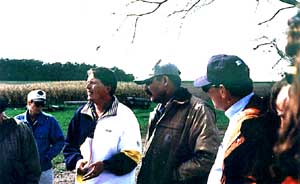
about - agriculture Bob King's emphasis is on growing and farmland use To consumers, farmers and community leaders in Monroe, Orleans and Genesee County, the name Bob King is familiar. Readers of local newspapers might also recognize Bob King's name because he is so often quoted on matters having to do with agriculture, farmland and the food that is grown or produced locally. King's high profile and popularity has everything to do with the fact that he is an eight-year veteran of Cornell Cooperative Extension, the Agriculture Program leader for Monroe County, and spends most of his time with regional farmers, town and county government and the media networking, teaching and helping to implement public policy and productivity procedures based on information and research at Cornell and other Cooperative Extension resources. "Cornell Cooperative Extension is in a unique position to help. It's one of the things I really like about my job," King says. "We have a huge reservoir of research and education that we're able to tap into and apply to the community - not just farmers but the whole community." Two key words keep popping up in conversation with Bob King: productivity and profitability. It's hard for anyone to find fault with either. Dr. King came to Monroe County following a stint at Penn State where he taught in the agronomy department and earned a Ph.D. in Agricultural Education. His doctoral thesis was based on research he did on nitrogen testing of agricultural soils. While he did not grow up on a farm, he has Pennsylvania farm background on both sides of his family, and in his teenage years he took an interest in the dairy farms of his friends and neighbors. King says he chose agriculture education as a career path because, "I enjoy working with people, I like having that interaction with people but I also like that I can use both hands and my head. I enjoy not only thinking about something, but also being able to get my hands into it." "Over the years at Cornell Cooperative Extension, my job has evolved. Today I do a lot of work on land use - rules, regulations, laws and ordinances. There's a big need for agriculture production and profitability expertise." "Another thing I work on is media - to get the word out to people so they know what's happening at their back doors, what farming is locally and how it relates to them." There have been some changes in priorities of his work recently. "Before September 11, 2001, we were more concerned with infectious diseases on the farm, like hoof and mouth disease," King said. "After September 11, we're more focused on international mischief. We're getting more into an era of physical security as it relates to milk tampering, anhydrous ammonia theft (a nitrogen fertilizer used by drug dealers to make methamphetamine) and bio-terrorism. Farm and food-supply security concerns nationwide have become a high priority throughout the agriculture community and for that reason King finds himself working more often and more closely with law enforcement, providing scientific and technical information so they can put their analytic and investigative skills to work more efficiently. King was involved in a recent investigation of milk tainted with antibiotics on several regional farms. While bio- or eco-terrorism is not suspected in these as-yet-unsolved cases, King says farm security, for a variety of reasons, has become a hot-button issue. "My work has taken on a major emphasis on security, making sure the farm gate is secure. A lot of farmers in Western New York leave stuff out in the open, unattended, where it's easy to get at." Locking and lighting are just two things King says farmers should be doing these days to protect themselves from theft and vandalism. Keeping farm medicines like antibiotics and chemicals under lock and key is basic, along with lighting of vulnerable areas. Centralizing access onto farm property through a single gate or road is also suggested and, King says, "farmers should keep desirable materials out of sight. There's no reason to keep tanks or containers in view where a thief just driving down the road can spot what he's after." While farm security and bio-terrorism is an increasingly large part of his job, by far, most of King's time is still spent on community land-use issues. "I work closely with municipalities, farmers, landowners and home owners on making sure the laws and regulations are understood by all parties and that they are properly and consistently applied. "We get into a lot of concerns about noise, odors, and dust, and complaints about what farmers are doing. Even though farms may have a right to do it, homeowners at times can get very agitated. When people get angry, there's all kinds of things they can do. So a lot of time what we get into is trying to mediate between the two parties." "We try to find common ground between farmers and their non-farm neighbors. Lots of people in this area are annoyed by the odor of rotting cabbage, for instance, or the blasts from bird cannons, or slow equipment on the road." "It's usually fifty-fifty. Fifty percent of the time, on lots of these issues, farmers are well within their rights to profitably use their property. Another fifty percent of the time they go over the edge." "We seem to live in an era today where a lot of people, including farmers, don't know their neighbors and a lot of my job is just to help people get to know one another again. Once you're more familiar with who your neighbor is, people tend to get along much better. Once you visit with people back and forth, learn what their needs are, and what's important to them, usually there's an amicable resolution and everybody's happy." If mediating between farm and non-farm neighbor disputes isn't tricky enough, King also has the difficult task of being an advocate of farmland protection on one hand and sympathetic to the desire for economic development on the other. "Farmland is an intrinsic part of our community. It's an important part, not only in terms of economic growth and economic vitality for the community, but also for the character of a community. Farming provides us with an intrinsic satisfaction. It plays a large part in people's lives in terms of having open space. And, it provides balance in people's emotional mind set - something that tends to be overlooked by many people. "One of the things I've learned, being based in Rochester is: It's not just making money to support your living, it's also being in an environment in which you can enjoy your living. And, farming provides for a large part of that." "I'm doing a lot of work now with municipalities to help them implement farm protection and preservation plans. I visit with town supervisors and town board members one-on-one. Twenty years from now we'll have more development, no question. But, to what extent will that development be compatible with agriculture? It's not that farmers or advocates of farmland protection are against development, the question is whether that development is compatible." "I think agriculture and farming will always be here in western New York because we have unique soils, and good growing conditions, and because we have large markets that can provide large revenue to farmers who have access to it." Throughout the region, King says, "there is interest in promoting and growing agriculture, using value-added strategies such as packaging fresh market veggies and fruits for single servings, encouraging agri-tourism, farm stands, festivals, etc. All these kinds of things are being looked at." Emphasizing farms and farmland makes good sense for Hamlin, according to King, because "it's a cornerstone of agriculture for the county because of its size and intensity. It's local economy and land base is farming. Although the location of a business or manufacturing plant might help, the current infrastructure favors farming." Dairy farms are still the largest farm revenue generator in western New York, and the local dairy industry is the backbone of agriculture in our region. "If dairy went down on its knees," King says, "a lot of the other sectors of agriculture would go down with it because the dairy industry provides the agribusiness infrastructure that you need for successful farming in the region. That infrastructure includes things like equipment sales, fertilizers, pharmaceuticals, hardware and that kind of stuff." Vegetable processing and fresh market produce comes right behind dairy in economic importance. Sweet corn, snap beans, dry beans, cabbage, peas, squash, strawberries, pumpkins, onions, garlic and apples, pears, peaches, plums are all produced locally and contribute to farm income. "Rochester is an urban open market so a lot of growers want access to it and that's where I come in. I dovetail my production background and media skills to make that connection - to push local products onto local markets. A lot of the time people just aren't aware that home grown produce is available locally. When consumers buy locally produced agricultural products that money stays here in our community." "We're not only interested in protecting farmland," Bob King says, "we're also trying to make it profitable." |

 An unfolding squash blossom decorates the end of August scene. Dr. Bob King lets consumer and agribusinesses know about such topics as crop yields, land use and preservation issues and environmentla matters as he promotes regional farming. Photo by Rick Nicholson.
An unfolding squash blossom decorates the end of August scene. Dr. Bob King lets consumer and agribusinesses know about such topics as crop yields, land use and preservation issues and environmentla matters as he promotes regional farming. Photo by Rick Nicholson.